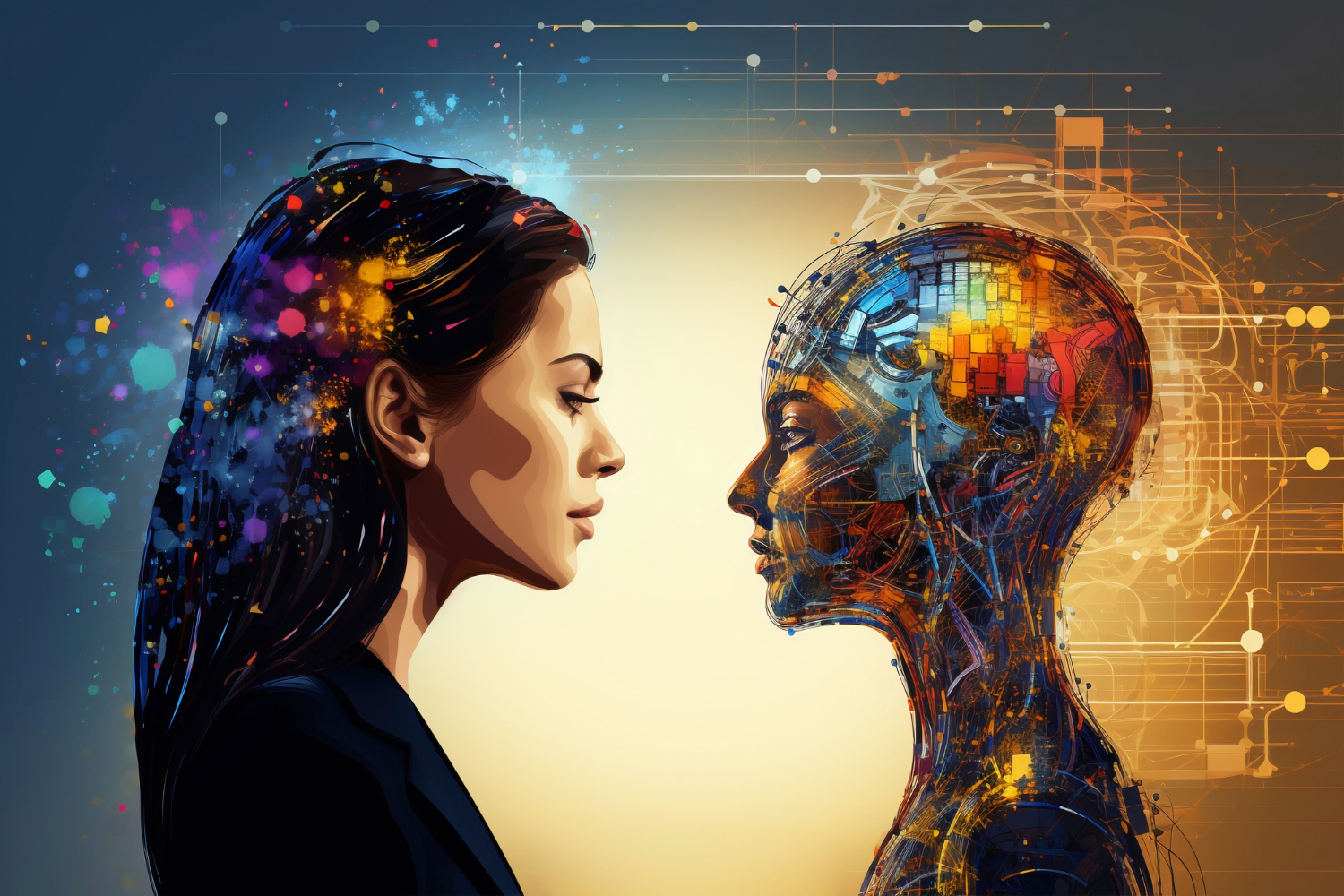AI is doing wonders in the field of medicine by driving the efficiency of physical health applications. However, the mental health area is still a little behind because mental health practitioners are more hands-on and work with their soft skills. For instance, a psychologist sits with the patient, looks into their eyes, and firmly creates a space for the patient to let out their emotions and understand them properly. Mental health clinic data is mostly subjective and qualitative, like writing down patient’s statements and taking notes of the important points. However, there are still many more areas where AI can drastically transform the ongoing diagnosis procedures and develop better-suited platforms that will smoothly connect mental health practitioners with patients and provide people with the AI-powered best and all-time available mental health support.
In this blog, we will read about the potential of artificial intelligence in revolutionizing mental healthcare services for people and making them more accessible and easier.
Problems With Traditional Mental Health Care Services
Before diving into the transformations that AI will bring into the field of mental health services, let us first check out the challenges faced by the people in the current scenario.
- Lack of Accessibility
Currently, mental health services are not accessible to many people due to several reasons like time constraints, long waiting lists, unavailability of mental care services in rural areas or countryside, and so on. This can lead to negligence of the mental state of people or significant delays in receiving necessary care, potentially exacerbating mental health issues.
- High Cost
It is no new that mental health care services can be prohibitively expensive, especially for those with limited financial resources. Therefore, many people do not want to keep up with costly therapy sessions, medication, and other treatments for their mental health and try to handle their mental state on their own.
- Shortage Of Mental Health Professionals
There is a significant shortage of mental health professionals such as therapists, counselors, and psychologists, especially in remote or underserved areas. Due to this shortage, the problems of long waiting lists or inaccessibility arise. This is why, in this digital age, it has become crucial for the mental health industry to adopt advanced technologies to handle patients more efficiently and make mental health services accessible to everybody.
- Lack Of Personalized Care
Traditional mental health care often follows a one-size-fits-all approach, which is not an effective strategy to address the different needs and circumstances of every individual. Sometimes, the situation of an individual looking out for mental health support is unique and, thus, needs to be tackled with personalized support strategies.
Hence, these accessibility and cost-related issues can create barriers for people seeking and receiving mental health care, potentially turning the condition even worse and leading to adverse long-term consequences.
By leveraging AI technologies, such as natural language processing, machine learning, and data analysis, it may be possible to address such challenges faced by the people for traditional mental health care services. AI solutions bridge the gap between the demand for mental health services and their accessibility.
Applications of AI in Mental Health
Let us now read about how AI is used in mental health. Below listed are the applications of artificial intelligence for improving mental health scenarios:
- AI ChatBot For Instant Mental Care With NLP
The major problem with the current mental health services is the time and accessibility constraints. With the help of AI, mental care chatbots can be developed, which can offer first care to the person needing medical attention. For instance, if someone is having an anxiety attack at 2 AM at night, they can open their mental care and text or voice chat (using natural language processing) with the AI mental health representative about their condition. The AI will assist them with instant relief tricks and tips which will help to stabilize the condition until the person visits the mental health professional. Thus, AI makes mental health services available to people anytime and anywhere.
- Virtual Reality Therapy For Anxiety And Trauma
Virtual reality therapy is an innovative approach that combines virtual reality (VR) technology with evidence-based therapy techniques to treat individuals suffering from anxiety disorders or trauma. In this method, patients are immersed in computer-generated simulations that safely trigger the anxiety or trauma of the patient, allowing the patients to confront their fears and traumas in a controlled environment. Therefore, patients develop coping mechanisms and desensitize themselves to their triggers. VR therapy has proven to be quite fruitful in treating various diseases like post-traumatic stress disorder (PTSD), phobias, and anxiety disorders.
- Tailored Treatment Plans Through Data Analysis
AI systems can analyze all the patient data like their past treatments, electronic health records (blood tests, brain images), questionnaires, behavioral symptoms, medical history, lifestyle, and treatment responses. By studying all this data, AI can produce personalized treatment recommendations and highlight the areas of special care that will help the mental health practitioner and the patients in better management of their mental state. In addition, such data insights also help the mental health professional in the early detection of the underlying diseases of the patients.
- AI-Powered Mental Health Education
When it comes to mental health, many people are unaware of their conditions; for example, a person might be experiencing anxiety and heart palpitations but would just be thinking it is acidity. To tackle this problem, AI-backed mental health tools can play a big role in spreading mental health awareness to people. AI chatbots and apps can provide accessible mental health information, including different types of mental conditions, coping mechanisms, and self-help resources to help people manage their mental condition. Moreover, AI helps mental health professionals to be updated on the latest research, technological solutions, therapy, and practices, allowing them to provide high-quality service to their patients.
- Easy Workflows To Support Mental Health Professionals
Similar to AI healthcare, AI will automatedly perform most of the tasks like scheduling appointments, record maintenance, and keeping all the patient treatment summaries in the portal for future reference. Thus, artificial intelligence for mental health has the ability to drastically transform operations with its groundbreaking ability to automate tasks, which will, in turn, boost efficiency and accuracy and reduce the pressure on management.
- Enhanced Patient Engagement
AI helps to promote patient engagement strategies on behalf of healthcare organizations to encourage patient engagement and provide improvised and personalized experiences to them. Moreover, companies vastly use AI chatbots and voice assistants to process phone calls and patient messages and drive reminders and positive, motivational messages to the patients to enhance their mental state and healing journey.
Thus, AI for mental health is a great way to optimize the daily tasks of the mental health clinic and to support patients in their times of need. However, it is important to note that AI should be used as a complementary tool to augment human expertise rather than a complete replacement for human mental health professionals.
Benefits of AI in Mental Health
There are a number of benefits that AI offers in mental health. Let us discuss them in detail:
Makes Mental Care Affordable
Earlier, people used to schedule their therapy sessions by missing their work and traveling to faraway locations to get mental health care. On the other hand, AI now makes mental health services available to people anywhere and everywhere. Also, some AI solutions may even provide mental health support at negligible costs, which would attract a lot of people who would desperately require medical attention for their mental state.
Increases Access to Care
By making mental health care services digital and affordable, AI increases the access of people to medical care for their mental conditions. Also, AI and NLP-powered conversational bots remove time constraints, allowing people to get their mental health support instantly and at any time.
Enhances Efficiency
By Automating all the operations of the healthcare organization like appointment scheduling, record keeping, patient record maintenance, and customer care services, AI boosts the efficiency of the mental health business, reduces the pressure on management, and allows the staff to work more on providing quality care to people.
Ease Of Opening Up
Encryption-backed AI chatbots create a safe space for people in case they need to share something very confidential or embarrassing, which people may find shameful to share face-to-face with mental health professionals, thus allowing individuals to talk about their mental health and open up freely.
Provides Support To Therapists
By studying the patient data, producing insights on the underlying patterns, and recommending the best-suited treatment techniques, AI helps mental health practitioners to provide customized and accurate treatments to the patients, thus easing up the task of the mental healthcare faculty, and enhancing patient’s journey to the mental well being.
Mental Health Illness That Can Be Treated With AI
Now as we have a broader picture of the applications of AI in mental health and the benefits it brings to the industry, let us discuss examples of diseases that can be treated with the help of AI:
- Depression
According to Mental Health America, depression is one of the most common mental health diseases among Americans, affecting more than 8% (21 million) of American adults every year. Therefore, it is important to opt for enhanced treatment techniques to treat depression, for which AI stands first. AI helps to bridge the gap between the patient and the treatment by offering responsiveness and accessibility. AI chatbots provide 24/7 mental support to patients, thus extending instant help to patients. Moreover, they gather the patient’s data to show real-time insights for the mental health practitioner, allowing him to provide tailored therapy to the patients.
- Anxiety
Anxiety disorders are another common mental illness found in the USA, affecting over 19.1% of the total population, tallying over 40 million. Out of those 40 million, 6.8 million adults suffer from generalized anxiety disorder (GAD). Apart from this, young people tend to go through anxiety more than adults, and women tend to suffer more than men. Thus, with advanced technologies, AI can help in handling this alarming situation of anxiety in America. By using AI-backed wearables that track anxiety symptoms like heart rate, physical activity, and sleeping patterns of the patient, AI keeps a 24/7 check on the patient and helps to produce data-driven insights for psychiatrists and psychologists to understand the roots of the anxiety problem in the patient.
- Schizophrenia
Schizophrenia is a mental health disorder characterized by disturbances in thoughts, behavior, emotions, and perceptions. People suffering from Schizophrenia also experience symptoms like hallucinations, delusions, diminished emotional expression, disorganized thinking and speech, and so on. To help with this Schizophrenia, AI, ML, and deep learning algorithms can provide an objective and evidence-based approach to enhance the accuracy of the treatment. Moreover, AI tracks the neuroimaging data, and AI-backed avatars and virtual reality therapy can help in therapeutic interventions and the better management of Schizophrenia.
In the end, we can say that the AI has the power to transform the mental health treatments for the people. By offering all-time mental support, personalized interventions, and global accessibility, AI has helped mental health practitioners treat their patients in a better, more efficient, and more accurate manner. Also, AI, in combination with other cutting-edge technological treatment solutions like virtual reality therapy and portable devices, enhanced the advantages akin to adding more fuel to the fire. Therefore, integrating AI into mental health care represents a comprehensive and influential strategy, underscoring the essential contribution of AI in enhancing the journey toward well-being.
If you are looking for cost-effective and innovative AI development services, look no further because Build Future AI develops the best at the quickest! Email at business.buildfuture.ai to know more.




